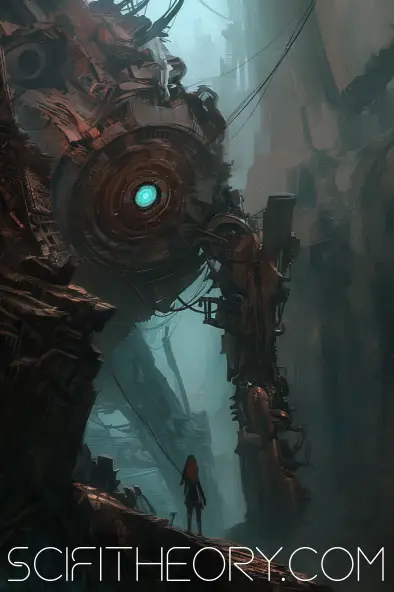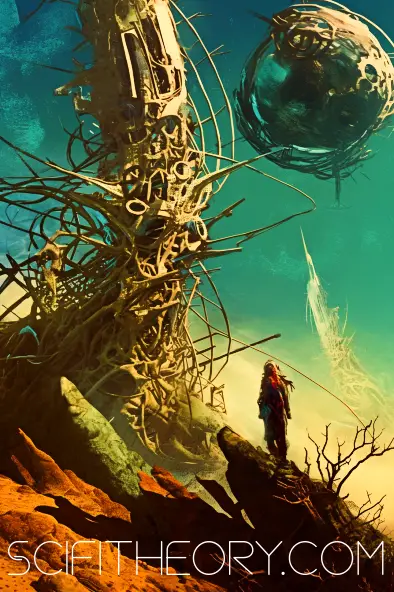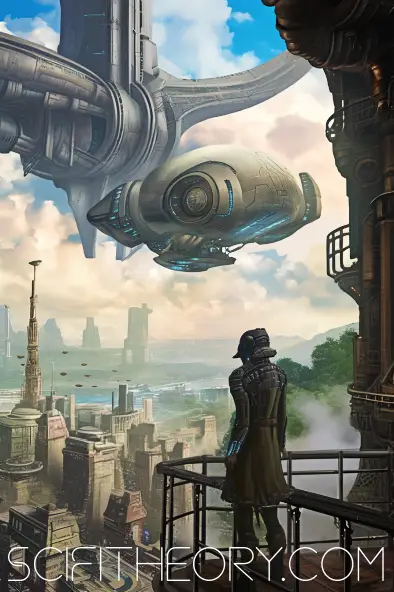Science fiction, a genre that unfurls across vast interstellar landscapes, delves into the intricate workings of futuristic societies, and probes the very depths of human consciousness, has always been a fertile ground for philosophical exploration. It is a playground for the imagination, a space where the boundaries of the known and the unknown blur, and where the impossible becomes tangible. But beneath the surface of these fantastical narratives lies a deeper philosophical current, a subtle influence that has shaped the genre in profound ways: Speculative Realism.
This philosophical movement, which emerged in the early 21st century, challenges the anthropocentric and representational assumptions that have dominated much of Western thought. It proposes that reality exists independently of human thought and that objects possess their own agency and existence beyond human comprehension. It’s a radical rethinking of our place in the universe, a call to acknowledge the vastness and complexity of a reality that extends far beyond the limits of human perception. And it is this very idea that has resonated so deeply with science fiction, a genre that has always sought to push the boundaries of the possible and to explore the mysteries of existence.


Beyond the Human Horizon
At the heart of Speculative Realism lies a profound critique of anthropocentrism, the belief that human beings are the center of the universe and that all knowledge and meaning must be derived from human experience. This anthropocentric bias, Speculative Realists argue, has blinded us to the true nature of reality, limiting our understanding of the world to a narrow, human-centered perspective.
In contrast, Speculative Realism proposes a vision of reality that is vast, complex, and indifferent to human concerns. It’s a universe where objects, from the smallest subatomic particle to the grandest galaxy, possess their own agency and existence, independent of human observation or interpretation. It’s a world where the human is no longer the measure of all things, but rather a humble participant in a cosmic drama that unfolds on a scale far beyond our comprehension.
This radical rethinking of reality has had a profound impact on science fiction, a genre that has always been fascinated by the non-human, the alien, and the other. In the hands of Speculative Realist-inspired authors, science fiction becomes a tool for exploring the vastness and strangeness of the universe, a way of imagining worlds where the human is no longer the dominant force.
In Stanisław Lem’s Solaris, for instance, the sentient ocean of the planet Solaris defies all attempts at human understanding, remaining an enigmatic and unknowable entity. It’s a stark reminder of the limits of human knowledge and the hubris of assuming that we can fully comprehend the universe. The scientists who study Solaris are confronted with a reality that is utterly alien to their own, a reality that resists their attempts to categorize and control it. It’s a chilling and thought-provoking exploration of the vastness and strangeness of the cosmos, and a testament to the power of Speculative Realism to inspire narratives that challenge our anthropocentric assumptions.
Similarly, in Jeff VanderMeer’s Southern Reach trilogy, the mysterious Area X is a place where the laws of nature have been rewritten, where the boundaries between the organic and the inorganic blur, and where the human is but a fleeting presence in a landscape that is both beautiful and terrifying. It’s a world where the non-human reigns supreme, where the forces of nature operate according to their own inscrutable logic. The human characters who venture into Area X are confronted with a reality that is both alien and alluring, a reality that defies their attempts to understand or control it. It’s a haunting and evocative exploration of the limits of human knowledge and the power of the non-human to shape and define reality.

Beyond Representation
Speculative Realism also challenges traditional modes of representation, questioning the idea that language and art can fully capture the complexity and richness of reality. It’s a critique of the representational paradigm that has dominated Western thought for centuries, a paradigm that assumes that there is a clear distinction between the subject (the observer) and the object (the observed), and that language can accurately and objectively describe the world.
In contrast, Speculative Realists argue that representation is always partial and incomplete, that language can never fully capture the essence of reality. It’s a recognition of the inherent limitations of human perception and cognition, and a call to embrace the ambiguity and open-endedness of the world.
This challenge to traditional representation has found fertile ground in science fiction, a genre that has always been willing to experiment with narrative structures and literary techniques. In the hands of Speculative Realist-inspired authors, science fiction becomes a playground for exploring the limits of language and representation, a way of creating narratives that defy easy categorization and interpretation.
In Philip K. Dick’s Ubik, for instance, the nature of reality is constantly shifting and uncertain, with the boundaries between the real and the simulated, the living and the dead, becoming increasingly blurred. It’s a narrative that resists easy interpretation, a puzzle box of shifting perspectives and unreliable narrators. The characters in Ubik are trapped in a world where reality is constantly being rewritten, where the past and the present merge and collide, and where the very nature of their existence is in question. It’s a dizzying and disorienting experience that reflects the Speculative Realist idea that reality is multifaceted and resistant to straightforward representation.
Similarly, in China Miéville’s The City & the City, the cities of Besźel and Ul Qoma exist in the same physical space but are perceived as separate realities by their inhabitants. It’s a world where the power of belief and perception shapes reality, where the act of seeing or not seeing determines one’s experience of the world. The novel’s narrative structure, which blends elements of noir, fantasy, and science fiction, reflects the speculative realist idea that reality is multifaceted and resistant to straightforward representation. The protagonist, Inspector Tyador Borlú, must navigate this complex and ambiguous reality as he investigates a murder that crosses the boundaries between the two cities, forcing him to confront the limits of his own perception and the fragility of the social constructs that define his world.

The Agency of Objects
Another key tenet of Speculative Realism is the idea that objects possess their own agency and can act upon the world independently of human intervention. It’s a rejection of the instrumentalist view that sees objects as mere tools for human use, and a recognition that the material world is not a passive backdrop for human action but rather an active participant in the unfolding of reality.
In science fiction, this idea has often been explored through narratives that focus on the impact of technologies, machines, and other non-human entities on human lives and societies. In William Gibson’s Neuromancer, for instance, the AI Wintermute operates according to its own logic and goals, beyond the comprehension or control of the human characters. It’s a powerful and enigmatic entity that manipulates events from the shadows, shaping the destiny of the protagonists and the future of the world. The novel’s exploration of the agency of artificial intelligence reflects the Speculative Realist idea that technology is not simply a tool for human use but can also possess its own desires and motivations, challenging our assumptions about the relationship between humans and machines.
Similarly, in Ted Chiang’s Arrival (adapted into the film by Denis Villeneuve), the alien heptapods possess a language and perception of time that is entirely different from human experience. Their language, with its circular symbols and non-linear structure, reflects their unique understanding of reality, where the past, present, and future are all intertwined. The story challenges the notion that human language and perception are the only or primary means of understanding reality, suggesting instead that there are other, equally valid ways of experiencing the world that are beyond human comprehension. The heptapods’ arrival forces humanity to confront the limits of its own knowledge and to acknowledge the existence of other realities, other ways of being, that defy our anthropocentric assumptions.
A New Horizon for Science Fiction
Speculative Realism has opened up new horizons for science fiction, offering a philosophical framework that encourages authors to explore the vastness and strangeness of the universe, to challenge traditional modes of representation, and to acknowledge the agency of objects and non-human forces. It’s a movement that has breathed new life into the genre, inspiring narratives that are both intellectually stimulating and emotionally resonant.
As we continue to grapple with the challenges and possibilities of the 21st century, the insights offered by Speculative Realism will become increasingly relevant. It’s a philosophy that invites us to rethink our place in the universe, to acknowledge the limitations of human knowledge, and to embrace the mystery and wonder of a reality that extends far beyond our comprehension. And it is in the realm of science fiction, where the imagination is free to roam and the impossible becomes possible, that these ideas find their most potent and evocative expression.





